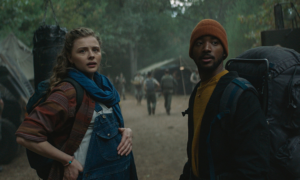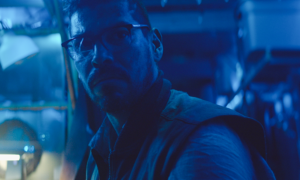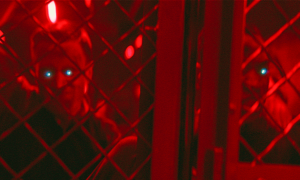Humanity has successfully created artificial intelligence and used the technology to create humanoid robots that will take commands from their owners in upcoming sci-fi drama Mother/Android. Now, every household has one to bend to their whim and will. However, when the inevitable happens and the androids revolt, it couldn’t come at a worse time for young couple Georgia (Chloë Grace Moretz) and Sam (Algee Smith), who have just discovered their pregnant. Nine months later and the couple are desperately trying to find shelter in a ravaged America where the war between humans and androids rages on.
Written and directed by Mattson Tomlin (Project Power), who was inspired to write the movie from his own personal adoption story, Mother/Android focuses on how Georgia and Sam can protect their little family in the face of extraordinary circumstances.
To find out more, we spoke to Tomlin about creating an intimate story of parenthood and why he wanted to set that during a robo-apocalypse…
How did you begin your journey with Mother/Android?
I graduated from the American Film Institute in 2014 and spent a couple of years trying to get a directing career started. The thing that I learned very quickly is that it’s not 1992 anymore. It’s not enough to get a small movie made and it’s not just going to go to Sundance like in the era of Clerks and Pi and these great movies that launched some stunning careers. It doesn’t quite work like that anymore.
I had a film professor who would always say ‘you have to write your way to the table’. I was not a particularly good writer, but I really enjoyed the process of writing. So from 2015 up through to now, I just focused on screenwriting, and that worked out. I got a movie called Project Power made and my film Little Fish. That levelled me up but all the while that was happening I was going ‘okay, but I’m a director, I’m a director, I’m a director!’.
I wrote many, many scripts along the way that were scripts that I wanted to direct and then finally a friend of mine said ‘you need to write something that’s so personal that nobody else can do it’. So I took tenants of my adoption story, and put them into the script in this movie. Once I had that it became ‘okay, I have this script that tells this personal story and I would rather it not get made than anybody else make it’ and so that makes the conversation a lot easier. I first wrote the script in 2017 and now, here we are, it’s out!
So you would advise aspiring filmmakers to try out writing first?
Yeah. I mean the brutal reality of it is that nobody wants you to be a director. In order to be a director at any level it involves permission and acceptance from other people, and sometimes it involves lots of money. When you’re a first-time filmmaker, that’s always going to be a risk. So nobody is going to be falling over themselves trying to make that happen for you. Writing’s free and it doesn’t involve anybody’s permission. You can write a bad script and it’s not going to hurt anybody. It’s not going to ruin your career. Then you can look at it and go ‘okay, what doesn’t work about this? Okay, I’m going to get better’.
So I would always say for anybody to start with the writing because that’s where you have all the power.

How did you go from your personal adoption story to a robot apocalypse story?
For me, there is a version of this movie that I would love to make someday. That tells the more straight drama version which is set in Bucharest in 1989 and follows these two young people that find out they’re pregnant. [But] anytime I sat down and thought about doing that version, the Hollywood side of my brain was just very loud going, ‘no one’s gonna let you make that dude! That’s not the movie that is going to launch your career. I’m sorry. It’s just not.’
So, some of it was just practical, knowing that genre makes people feel safe. Genre is the thing that makes you go ‘okay, we can we can sell this’. But also, I love genre movies. I think that we’re in an era right now. Matt Reeves (The Batman) is my producer on this movie, and you look at his entire career, all of his movies are genre movies that also tell really personal stories within them. Even somebody like Jordan Peele and the success that he had with Get Out where he’s talking about very real things and I don’t think that genre dilutes that at all.
There were enough examples like that where I went ‘I think that genre could actually help me tell this story because it’ll help people engage with it a little bit easier’. I mean, the movie is not a very American movie. It doesn’t tell a very American story. So for me, it was very much just the mercenary ‘what do I have to do to get this thing made? Okay, killer robots that that will help do it!’.
But then there is also a part of me that loves killer robots and going ‘what if you put Terminator and Blue Valentine together?’ I want to see that. Nobody else has made that movie.
The movie mentions the 1921 play R.U.R, which featured the word ‘robot’ for the first time. What is it about robotic life that’s kept us interested in it for all this time?
Everything the character Arthur [in the movie] says about that play – I wasn’t making stuff up. I went down this road of going ‘okay, this word ‘robot’, where does that come from?’. And it led me to that play. It really just sent a chill down my spine, the thing he says: ‘It’s a play about building robots and the play ends with the destruction of the human race. We knew what was going to happen the second we gave it a name.’ That’s real.
I think that going all the way back to Mary Shelley’s Frankenstein – we’re so drawn to the power of playing God even though it seems so clear through all of our myths and legends that anytime you do that, it’s going to take us into a very dark, bad place.
As I see technology progressing, in reality, we’re already in a fairly dark technological place. We’re going to walk right into this and no amount of science fiction is gonna deter us because human beings are what human beings are. We love playing God and we love destroying ourselves.
I don’t know. It’s a very cynical way to look at the world but having spent a lot of time thinking about killer robots there’s no good reason for us to be doing this!

Androids have been depicted plenty of times and the ones in Mother/Android look very human. Why did you want your androids to look like they do?
The first thing was just looking at the constraints that I had! It’s obviously my first movie and it’s not a big-budget film. So instantly it was like ‘okay, what can we achieve here within the limitations that we have?’ What was very exciting to me is to go back to the roots of the original Terminator where so much of that movie is just a guy. It’s just an actor. Now, in that case, they chose a really specific-looking guy. But it’s still a guy. Then a little bit of makeup here and there that is done really effectively. For 85% of that movie, that’s what they’re doing.
[We didn’t want to] go the iRobot way, or the way where it really feels like these are machines, but instead to where they really look like people. Narratively that puts you in a place where you can’t trust anybody. Anybody who comes around, you’re going to be suspicious of. Are you human? Are you going to hurt me? Are you going to ruin my life? There’s a metaphor there for what we’re going through with this plague, certainly.
Then on the other level, the movie is called Mother/Android. It promises the robot. So I wanted to do something where it felt like they were there. The movie is also not called ‘Robo-Apocalypse’. It is this other kind of story where the point is not so much the androids, it is this mother’s journey. The genre stuff is so delicious, but I was very nervous that it would eclipse what I was trying to do. So my whole thing was to keep it about the kids. Keep it about the drama. Keep it about the emotion and never let the robot stuff get so big that you feel like you’ve lost those people.
That was the balancing act. I think that for other filmmakers, the ratio would be inverted and it would be much more robotic with a peppering of the pain.

What was it like telling a very small story set against a bigger, worldwide story?
For me, it was all about the point of view. I did a very similar thing in a movie I wrote called Little Fish, which is also a lower-budget film that takes place during a pandemic.
Some of it just comes down to my taste. When I’m watching a movie and we start cutting to other people we haven’t met before, to have these little vignettes where they look up and they see the comet or whatever the thing is, I start to lose interest. I don’t know who those people are. I’m not invested in them. I really want to be with people that I’m being with.
Again, back to the budget conversation, you can do a lot with a little, so long as you’re doing it from a point of view. So there can be this big battle raging on and there can be this whole apocalyptic fight, but if you’re with one person and the camera is just over their shoulder, then you’re just experiencing what they’re experiencing. At any given moment, a person just has this many degrees of vision and so you’re not accountable for the whole world. You’re just accountable for what’s in front of them.
I certainly sympathise with people when they’re frustrated because they want certain answers, but that’s not real life. Even in this plague that we’re living through right now, we don’t have the answers. We can’t even agree on where it came from! As frustrating as that is, it’s kind of like, ‘do I need that information to deal with the situation at hand? On my day-to-day basis? No, not really. Maybe it would make me feel better or worse, but I’m just dealing with what’s in front of me right now’.
That was the approach for the movie and for me it is an exciting way to do it because it kind of goes against the grain of how these movies are usually done.
What do you want audiences to take away from the film?
Certainly love. We have that phrase: ‘If you love someone, you’ve got to let them go’ and I think that in Western culture, certainly in the United States, that’s a phrase that we reserve for dying parents or unhappy spouses. In the rest of the world, people are a lot more often thinking about that in terms of their own children. That is a hard, scary reality, but I think that it’s real.
There were a couple of mothers that worked on the film and almost in every case when I was interviewing people to work on it, they would read the script, and be on the ride and then they would get to the end and then they would get very mad. They would go: “I reject this! I would never do this! Fuck this guy!” Then a couple of days would go by and they’d still be thinking about it and they’d come back around and go: “If I were in a similar situation, the answer is, you do what you have to do.” Out of love. Even if that means making really really hard decisions.
For me, the movie is a love letter to these people that I never got to meet who brought me into this world. So what do I hope people take away from that? I don’t know. That love makes us weak and selfish but it also makes us really really strong.
Mother/Android is out now on Netflix.
